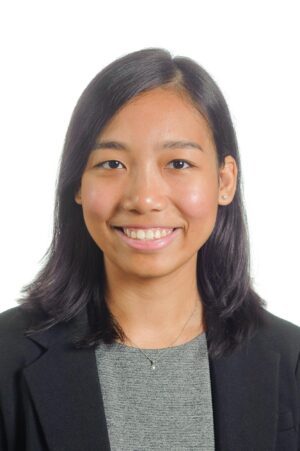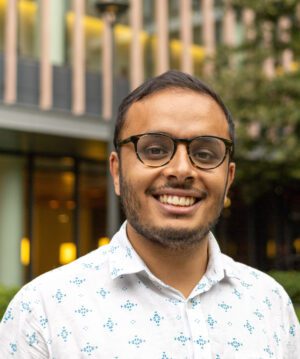The Himalayan Caucus at the Harvard Kennedy School may be one of Harvard’s newer South Asian-focused student groups, but its reach and breadth has grown rapidly. Started in December 2023, the Himalayan Caucus represents and shares the cultures from Himalayan countries with the Harvard community. Each semester they host social and academic events, and this past March participated in the Harvard Bhutan Spring Break Trek. We spoke with co-chairs Kailash Pandey, an MPA/ID student at the Harvard Kennedy School, and Soniya Gurung, an MPA student, to learn more about the Himalayan Caucus and its future plans.

Soniya Gurung, MPA student at Harvard Kennedy School
Mittal Institute: Thank you, Soniya and Kailash, for speaking to us! Can you share where you come from and why you are passionate about sharing Himalayan culture with Harvard?
Soniya Gurung: My family is originally from Nepal, but I was raised in Singapore and have lived in New York for the most part of my recent life. Growing up, I was surrounded by a blend of cultures, and that gave me a deep appreciation for the richness of my Himalayan heritage. At Harvard, I saw an opportunity to showcase and celebrate the cultures from the Himalayan region, which are often underrepresented. It’s really meaningful to me to share this part of my identity, especially in a global space like HKS, where we can foster understanding and connections across different backgrounds.
Kailash Pandey: I was born and raised in Nepal, and I first arrived in the U.S. for a high school program when I was sixteen years old. However, my childhood experiences instilled in me a great appreciation for the diversity in the Himalayas, both in terms of cultural heritage and livelihood. I grew up participating in cultural events of different communities in Nepal, particularly by playing music at various events. I wanted to share this rich heritage in the broader region in our community at Harvard and create a platform to not only celebrate these cultures but also have meaningful discussions on unique challenges and opportunities in the region.

Kailash Pandey, MPA/ID student at Harvard Kennedy School
Mittal Institute: You both started the group last year. What did that process entail, who came up with the idea, and what was the support like from the campus?
Soniya Gurung: The idea stemmed from informal conversations about how little representation there was for Himalayan countries in Harvard’s student organizations. Kailash and Bibek Kandel (MC/MPA ’24), along with a few other students, saw the need for a space to discuss the political, social, and cultural aspects of the Himalayan region. Setting up the group involved engaging with the Harvard South Asia Institute and the Office of Student Services, but we were lucky to have strong support from faculty and peers. Harvard’s community has been incredibly open to learning about new regions, and that’s been key to our growth.
Kailash Pandey: The idea really came about from informal conversations over dinner with other students from Nepal such as Bibek Kandel and Sansar Jung Dewan (MC/MPA’24) who resonated with the underrepresentation of the voices from the Himalayan region, both its cultural identity and climate crisis, that is increasingly becoming significant in the global landscape. We then had more conversations with other students from the broader region who loved the idea of a community for anyone who relates directly or indirectly to the region, personally or professionally. We then applied for the club through the Office of Student Services, and have since received a lot of support for our events from various institutes such as the Mittal Institute.
Mittal Institute: The Himalayan Caucus has participated in a number of memorable events, including a recent talk with the Nepal Prime Minister Rt. Hon. KP Sharma Oli (read the Mittal Institute write-up here). What events you’ve hosted or participated in as the Himalayan Caucus stand out for you?
Soniya Gurung: We recently had Dr. Pukar Malla speak about his experience with grassroots movements in Nepal and strengthening youth leadership for better governance. He was also joined by Professor Marshall Ganz, who used to teach him back when Dr. Malla was a HKS student! We also had an amazing line-up of guest speakers in Spring 2024, so it is tough to choose one! We have hosted a Master Chef, a Nat Geo Explorer, a Supreme Court Justice, and the Chair of the Nepal Economic Forum. Outside of these events, we also organize fun get-togethers during the holiday season for our members and serve good food like dumplings (aka “momo”).
Kailash Pandey: Besides the recent event with the Prime Minister that provided an opportunity for members of the community to engage in a constructive discussion and share their vision to a current head of state, the event that stood out for me was the one with Dr. Ananda Mohan Bhattarai, who was a Justice at the Supreme Court of Nepal. It was a fascinating opportunity to have a conversation with a highly respected figure, who had worked on several landmark cases on environmental and gender justice in Nepal. We learned both about his personal journey coming to the US for his graduate program in MIT to his professional reflections on paving his career back in the region.

The Himalayan Caucus team (2024-25) got a chance to meet with Nepal’s Prime Minister, K.P. Sharma Oli (second from left).

An event with Dr. Ananda Mohan Bhattarai, formerly a Justice at the Supreme Court of Nepal.

The first official meeting of the Himalayan Caucus in December 2023.
Mittal Institute: This past March, the Himalayan Caucus participated in the Harvard Bhutan Spring Break Trek – which is something that’s been running since 2017. What was that experience like, and do you intend to participate this year?
Soniya Gurung: We had a Bhutanese member of the Himalayan Caucus last year, Sonam Dorji (MC/MPA ’24), who was instrumental in bridging the gap between the host organization of the trek (Institute of Happiness in Bhutan) and HKS. In the past, an HKS graduate from Bhutan brought the trek to campus and since then, it has become a staple in student-led treks. The Bhutan trek will most definitely be back this year during winter break and I’m excited for all participants to experience this beautiful country!
Kailash Pandey: Sonam Dorji (MC/MPA’24) from Bhutan, who was an integral part of our team since its beginning, was a liaison for this particular trek. This is one of the most popular treks at HKS and we hope that it continues this year and looking forward to having some reflection events from interested participants.
Mittal Institute: What is something you would like our readers to know about the group?
Soniya Gurung: I’d like people to know that the Himalayan Caucus is more than just a cultural group – we are also focused on political and environmental issues that affect the region. Whether it’s discussing the geopolitics of the area or addressing the urgent need for climate action, we aim to foster deep, meaningful conversations about the future of the Himalayas and its people. Everyone is welcome to join, no matter their background – the diversity of perspectives is what makes our discussions so rich.
The Himalayan Caucus is more than just a cultural group – we are also focused on political and environmental issues that affect the region.
Kailash Pandey: I would like everyone to know that Himalayan Caucus is open for anyone who cares about the region and relates to the region in some capacity. We hope to increase the type of events focused on bringing climate adaptation and resilience challenges in the region to the forefront of the discourse at HKS. We’ve appreciated the people who have shown interest to share their professional or personal experiences in the region and look forward to the community growing even more this year with all the diverse perspectives.
Mittal Institute: What’s on the horizon – any interesting events planned?
Soniya Gurung: It’s the holiday season in Nepal now so in the near-term, we are looking at cultural events revolving around the festivals coming up.
Kailash Pandey: As Soniya said, we are hoping to have some cultural events with the ongoing festival season. We are actively planning some events like the ones we had last year but also hope to add ways to create an avenue for members of the community who’ve spent their personal or professional lives in the region to share their experiences.
